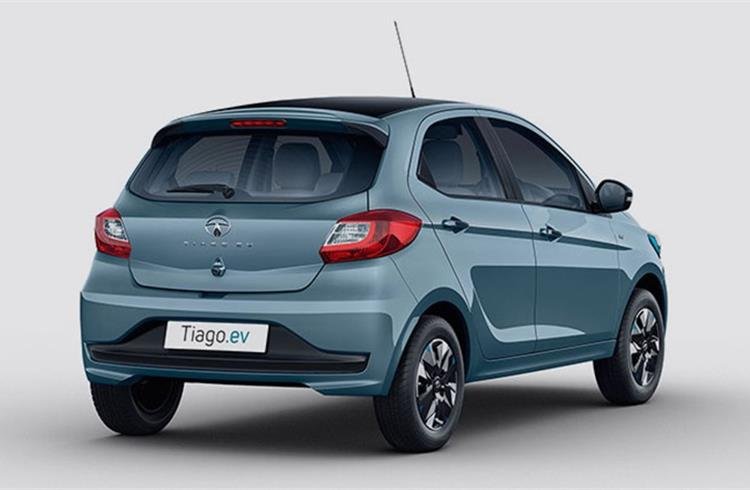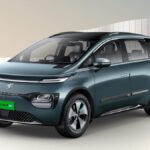The government’s push for electric mobility, along with increasing awareness about environmental concerns, has escalated the hype of electric vehicles in India. Consumers are looking to move towards more environment-friendly options. If doing something for a better cause comes with cost-effectiveness, interests will shift formidably.
Comparison of Popular EV cars in India under 15 Lakhs
There are several popular EV models available in India that fall under the affordable price range of 15 lakhs. Let’s compare some of them:
TATA Punch EV
The base model for this 5-seater EV starts from ₹ 10.99 Lakh. Its fast charging support takes 10%-80% in just 56 minutes. Other features include 360-degree surround view camera system, smart digital DRLs, auto LED projector headlamps, Digital Dashboard, etc. The top model of the Tata Punch costs around ₹15.49 Lakh.
| Particular | Number |
| Base Model Price | ₹ 10.99 Lakh |
| Charging Time | 9.4 hours |
| Range | 315 km |
Citroen eC3
A top speed of 107 kmph, fast charging support, and a host of catchy design elements make the Citroen eC3 one of the top EV cars in India under ₹15 lakh. It takes approximately 10 hours and 30 minutes for a full charge and has a 320 km range at complete battery backup. The company is prompting comfort as one of the USPs. There is 1378 mm of shoulder room for rear passengers and a lot of space for luggage.
| Particular | Number |
| Base Model Price | ₹ 11.99 Lakh |
| Charging Time | 10.5 hours |
| Range | 320 km |
TATA Tigor EV
Tata’s Tigor EV starts at ₹ 12.49 Lakh for the XE model and goes up to ₹ 13.75 Lakh for the XZ Plus LUX model. It has a driving range of 315 km and a charging time of 9.4 hours. The fast charging support takes 10%-80% in 59 minutes. One of the standout features of the Tigor EV is that it reaches 0 to 60 km/h in 5.7^ seconds.
Good tech, styling, and value for money take the Tigor EV amongst the top EV Cars in India Under 15 Lakhs.
| Particular | Number |
| Base Model Price | ₹ 12.49 Lakh |
| Charging Time | 9.4 hours |
| Range | 315 km |
Tata Teigo EV
Tiego is one of the most affordable EV cars in India. The price range starts at ₹ 7.99 and reaches up to ₹ 11.89 Lakh for the top model, the XZ+ Tech Lux. The charging time for a full charge is 8 hours. Features such as 0 to 60 km/h in 5.7^ sec and a driving range of 315 km are similar to those of the Tigor EV. In terms of affordability, it is one of the best EV cars in India under 15 lakhs.
| Particular | Number |
| Base Model Price | ₹ 11.89 Lakh |
| Charging Time | 8 hours |
| Range | 315 km |
MG Comet EV
MG Comet EV is the cheapest EV car in India, with the base model starting at ₹6.99 lakh. The exclusive version of the EV costs ₹ 9.00 lakh. The claimed single charge run by the company is 230 km. Comet EV is preferred to move in and around the city. Its boxy design makes the style interesting. MG Comet EV comes with a 17.3 kWH Li-ion battery.
| Particular | Number |
| Base Model Price | ₹ 6.99 Lakh |
| Charging Time | 7 hours |
| Range | 230 km |
Why Electric Cars? Are they useful in India?
Owning an electric vehicle (EV) in India comes with several benefits.
- Eco-friendly – The single most-promising feature of EVs are: they are eco-friendly, as they produce zero tailpipe emissions. Cleaner air and a healthier environment are the primary talking points. By choosing an EV, you can help reduce air pollution and combat climate change.
- Lower operating costs – Electric vehicles have lower operating costs compared to traditional gasoline or diesel-powered vehicles, as electricity is generally cheaper than fossil fuels. Moreover, EVs require less maintenance as they have fewer moving parts and do not require oil changes.
- Smooth Driving Experience – EVs offer a smooth and quiet driving experience. Electric motors provide instant torque, resulting in quick acceleration and a responsive driving experience. The absence of engine noise makes for a quieter ride, enhancing the overall comfort and tranquility of the journey.
- Incentives – Owning an electric vehicle can also help you land certain incentives and privileges. Some cities in India offer free parking or discounted parking rates for EV owners. EV owners sometimes have access to special lanes or exemptions from certain toll fees, making commuting more convenient and cost-effective.
Future of Electric Vehicles in India
The future of electric vehicles in India looks promising. The government has set ambitious targets for electric vehicle adoption. It aims to achieve 30% electric vehicle penetration in the country by 2030. To support this goal, the government is investing in charging infrastructure development, research and development, and policy frameworks to promote EV manufacturing and adoption.
EVs are becoming even more affordable and accessible to the masses with lowered battery prices due to advancements in technology. The future of EVs in India holds great potential.






